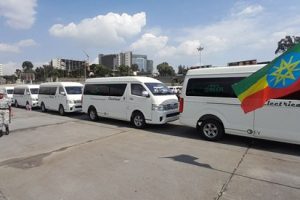BY HIZKEL HAILU
Undeniably, Ethiopia has enjoyed rates of economic growth consistently higher than other countries in the region, and at an average 11 %, some of the highest in the world over the last decade. According to the information obtained from International Labor Organization (ILO), the country’s government aims, through a broad Industrial Development Strategic Plan, to achieve middle income status over the next decade.
Based on the invitation of the government and other Ethiopian stakeholders, Better Work’s parent organization under the auspicious of the ILO, has initiated a comprehensive and coordinated intervention to advance decent work and inclusive industrialization in the country. Nation’s economy can never brought development only through increasing the number of industries and factories, but also it should be better to establish better working environment.
Cognizant of the fact that, the Addis Ababa City Administration is working together with ILO in giving priority to make better working environment in industries. Apparently, the textile and garment sector has been identified as a key priority for the first phase of this strategy. Better Work will be instrumental in this phase through strengthening enterprise level practices, building labor inspectorate capacity and, ultimately, providing a blueprint for the expansion of decent work practices into other industries.
On top of that ILO has recently announced that it is keen to support the government in setting minimum wage for labors. In collaboration with Addis Ababa City Administration Labor Enterprise and Industry Development Bureau (AALEIDB), ILO has organized a workshop targeting on advancing decent work and inclusive industrialization across Ethiopia.
According to the Organization’s ‘Siraye’ Project Head Kidist Chala, labor workers in Ethiopia are not guaranteed with desirable protection. Labor Administration and Inspection should be delivered in due of international laws that has been signed by the Ethiopian Government.
In this regard, ILO has a platform to enhance inspectors and to guide complaints, she said. The Ethiopian government has begun process to set minimum wage though the regulatory body has not been organized yet. However, ILO is keen to cooperate with the government in due course of running such activity, she added.
Talking about ILO- Siraye Project she said that, the program is not only to speak about workers right; but, to enhance workers’ and employers’ organizational capacity for inclusive industrialization. The overarching development goal of the Program SIRAYE (Amharic for “my Job”) is to see improved respect of workers’ rights leading to greater incomes and compensation, enhanced safety, equality, voice, and representation. The program also aims to lift industrial productivity and competitiveness to enable a global competitive textile and garment sector; and encourage accountable and transparent government institutions.
On her paper presentation about the Siraye Program, she explained that the main objective of the workshop is to make the participants from different regions and city administration aware of the nature and benefits of the conventions ratified by the country coupled with the rights and obligations of the countries that have ratified the conventions.
Kidst further accentuates that the main objective of the program is to expand production and productivity of the industries. As to her, strengthening the employer-employee relationship through enabling employers and employees to distinguish between their rights and obligations is also the program’s target.
Mentioning that the work program has a budget of more than 10 million dollars, she stated that the program will be functional across the nation with a special focus on Addis Ababa city administration, Oromia, Sidama, Amhara and Southern Nations Nationalities and Peoples’ Regions due to their highest investment activity. So far, in the areas where the program has been implemented, it is possible to increase production and productivity and improve workplace safety, she added.
Addis Ababa Deputy Mayor and Head of LEIDB Jantirar Abay also said that the government is reforming labor administration. He further explained the government’s commitment to provide support and supervision so as to increase the production capacity of employers and employees.
“We have the large human capital and it needs modern and decent work. The government is also reforming the administration of labor. Accordingly, Addis Ababa city Administration is doing its level best to enhance labor security as industrialization growth in a speedy way in the capital and surrounding areas,” he stated.
The workshop is mainly focused on workers’ right to organize, collective bargaining and occupational health, as well as the conventions that Ethiopia has ratified. On his opening remark during the workshop, the Deputy Mayor said that support and monitoring is expected from the government to increase the production capacity of employers and workers.
Speaking at the opening of the training, by the rank of Head of the Department of Employer and Employees in the city administration, Yohans Mtiku for his part said that, Ethiopia should work hard to transform the economy from agriculture led to industrial one.
He called on employers and workers to play a key role in bringing peace to the industries and sustaining the national economic growth of the country. The bureau will work with stakeholders to create conducive working environment for the industry. He also said that, his office will work hard for the implementation of the agreement as stakeholders work together to ensure favorable working conditions.
Not only does the [ILO-Siraye] program bring experiences from the international community but also paves new way of delivering support in a holistic and coordinated manner, and it also assists the labor inspectorate in building capacity, it was stated.
The International Labor Organization (ILO) is the only tripartite UN agency that brings together governments, employers’ and workers’ representatives of 187 Member States, to set labor standards, develop policies and devise programs promoting decent work for all women and men. With an initial focus on the garment and textile industries, the ILO in collaboration with tripartite partners has developed a comprehensive and coordinated program to promote Decent Work and Inclusive Industrialization in Ethiopia, ILO documents revealed.
The program works at national, regional and factory levels involving different ILO departments and global programs to address the key challenges to advance decent work in Ethiopia. At the national level, under the leadership of the tripartite partners, the program facilitates dialogue among multiple stakeholders to develop a common vision and strategies to make Ethiopia an African hub of socially responsible producing garment for both global and domestic market.
Meanwhile, Hawassa Industrial Park has recently launched New Call Center to Support Workers. The EIC together with ILO, the BRIDGES program, and GIZ launched the Hawassa industry park worker’s call center. The center provides anonymous grievance recording and consulting services to workers. The service is expected to strengthen the labor management system and the industrial relations in the industrial parks.
The apparel sector currently employs more than 100,000 workers, 85-90 percent of whom are women sewers. Hawassa Industrial Park employs around 35,000 factory workers, more than 80 percent of whom are women.
Ethiopian Investment Commission also announced that Occupational Safety and Health (OSH) services promote the well-being of workers. However, OSH services at a national and regional level are not addressing the current needs of the sector and very few factories have functional OSH management systems.
According to EIC, Ethiopia’s textile and apparel sector has experienced a boom in export-led growth. The country aims to become one of the most competitive locations for light manufacturing. Trade agreements with the European Union through the Everything but Arms Act, (EBA) though now it is banned formerly the United States through the African Growth and Opportunities Act, (AGOA) provide preferential trade access for Ethiopian goods.
The commission is established with the objective to enhance the competitiveness of the national economy by promoting investments in productive and enabling sectors, creating more and better employment opportunities for Ethiopians and advance transfer of knowledge, skills and technology required for the development of the country, and to augment the role of the private sector in the country’s economic development.
Noting the importance of creating or restoring an enabling environment for sustainable enterprises, and in particular for small and medium-sized enterprises officials stressed that working with the government in setting minimum wage for labors is paramount important for economic recovery, development and reconstruction efforts.
The Ethiopian herald September 1/2022





